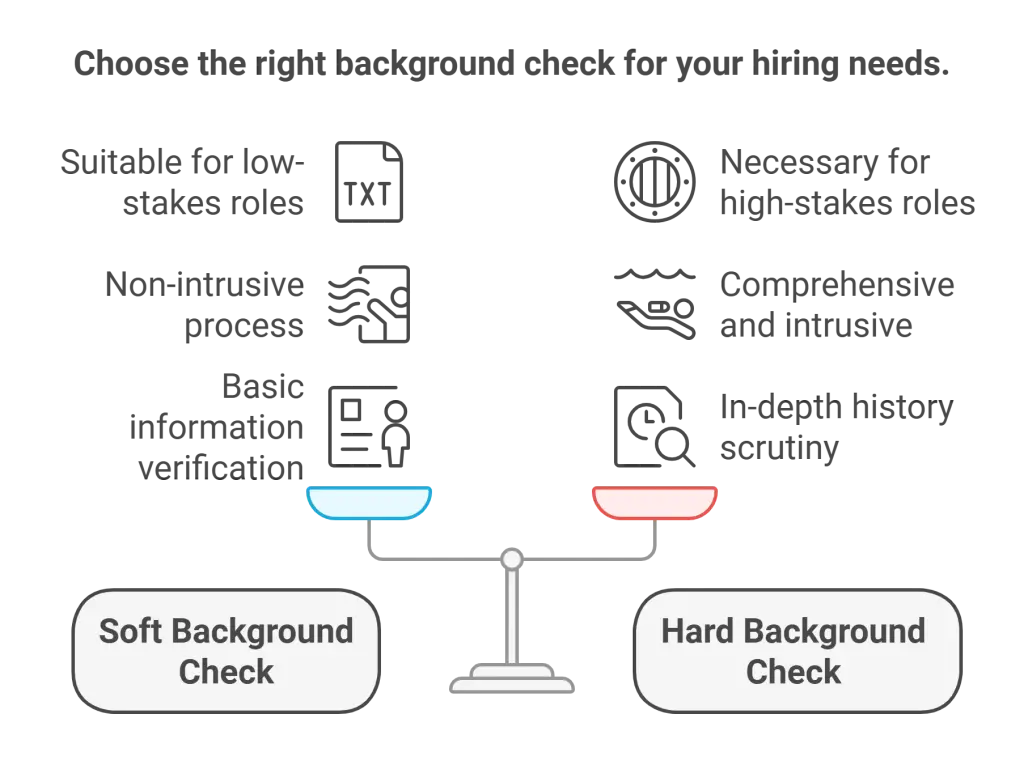Choosing between a soft background check and a hard one can be a pivotal decision in hiring. Each type of background check serves a different purpose and provides unique information. This comprehensive guide will walk you through the differences, benefits, and considerations for job seekers and employers
Key Takeaways
- Soft background checks provide basic information without impacting credit scores, while hard background checks offer comprehensive data but can affect credit scores.
- Soft checks are ideal for preliminary screenings and non-sensitive roles. They focus on identity verification, employment history, and education.
- Hard checks are necessary for high-stakes positions, including detailed criminal records, credit reports, and thorough employment verification.
- When choosing between soft and hard background checks, employers should consider job responsibilities, legal compliance, and privacy concerns.
- Job seekers can prepare by maintaining accurate records, addressing discrepancies proactively, and being transparent with potential employers.
- Hard background checks offer enhanced security, reduce hiring risks, and ensure compliance with industry regulations, but they also come at a higher cost and require more time.
- In many hiring scenarios, soft background checks are faster, more cost-effective, and sufficient for preliminary screening.
Introduction
Ever wondered why two types of background checks exist? It’s not just an arbitrary distinction. Understanding the differences between soft and hard background checks can save time and money and reduce hiring headaches. This article breaks down the essentials, offering an in-depth comparison to help job seekers and employers make informed choices.
Soft background checks don't affect credit scores, while hard background checks can impact them. Understanding these differences will help you confidently navigate the employment screening process, whether you're a job seeker or an employer.
This article aims to delineate these two types of background checks, highlighting their respective uses, benefits, and key differences. Understanding these nuances will empower you to navigate the employment screening process confidently and clearly, whether you're a job seeker or an employer.
EXPERT INSIGHT: The hiring process is more than just finding someone who fits a job description — it’s about building a partnership based on trust and transparency. It’s a harmonious connection between HR, the candidate, and the hiring manager. Choosing between a soft or hard background check is one of the most significant decisions, as it balances the candidate’s privacy with the need for an informed, high-quality decision that benefits the organization. By approaching background checks thoughtfully, we not only ensure we hire the right people but also maintain respect for their rights throughout the process. - Charm Paz, CHRP
What is a Soft Background Check?
A soft background check is a basic method employers use to gather information about a potential hire without impacting their credit score. It provides a surface-level overview rather than a deep dive into an individual's history.
A soft background check usually involves verifying an applicant's identity and reviewing their employment and educational history. It's a non-intrusive way to ensure that the candidate is who they say they are and that their resume aligns with their experience.
Scope: The kinds of information typically included in a soft background check are relatively straightforward. Employers might examine identity verification, past employment dates, job titles, and academic qualifications. The check is designed to confirm the fundamental details presented by the candidate without delving into more sensitive or private data.
Usage: Soft background checks are commonly used in scenarios where the role does not demand handling sensitive information, or initial screenings are more about verifying basic credentials than uncovering potential red flags. They are ideal for preliminary screenings or for positions that do not necessitate a rigorous vetting process. For example, entry-level roles, freelance positions, or volunteer work in non-sensitive areas often use soft background checks. This approach helps employers quickly filter out unqualified applicants before conducting more in-depth evaluations of shortlisted candidates.
By opting for a soft background check, employers and job seekers benefit from a faster, less invasive screening process, keeping the initial hiring stages efficient and respectful of privacy.
What is a Hard Background Check?
A hard background check is an in-depth screening process that goes beyond the basics to scrutinize a candidate's history and credentials thoroughly. Unlike soft background checks, hard checks often involve a more comprehensive set of criteria to uncover potential risks or red flags with greater precision.
Scope: Hard background checks dive deeper into various aspects of an individual’s background. Typical components include:
- Criminal History: Detailed examination of any criminal records at the state and federal levels to ensure the candidate hasn’t been involved in any illegal activities.
- Credit Report: Financial responsibility and stability assessment is crucial for roles that involve handling finances or sensitive information.
- Employment Verification: An in-depth review of past employment, including job titles, dates of employment, and reasons for leaving previous roles.
- Education Verification: Confirmation of educational qualifications and degrees, ensuring the candidate has claimed valid credentials.
- Professional Licenses: Verify any professional licenses required for the position, ensuring they are current and in good standing.
- Motor Vehicle Records: For roles that involve driving, a review of driving history and any potential infractions.
Usage: Hard background checks are typically reserved for high-stakes positions, and the risk of hiring the wrong candidate must be minimized. Common scenarios include:
- Financial Roles: Positions in banking, investment, or accounting where candidates can access sensitive financial data or significant amounts of money.
- Healthcare Jobs: Roles involving patient care or access to medical records require higher trust and reliability.
- High-Security Clearance: Any position that demands a high-security clearance, such as government jobs or roles in defense contractors.
- Executive Positions: Leadership roles where individuals make significant strategic decisions that could impact the entire organization.
- Roles Involving Children or Vulnerable Populations: Jobs in education, childcare, or elder care where ensuring the safety and welfare of vulnerable groups is paramount.
In conclusion, a hard background check is a powerful tool for employers who need a complete picture of a candidate's background, especially when the role involves significant responsibilities or handling sensitive information. While more time-consuming and potentially intrusive, these checks are critical in mitigating hiring risks and ensuring compliance with industry regulations.

Key Differences Between Soft and Hard Background Checks
When it comes to background checks, the details matter. Understanding the key differences between soft and hard background checks can help job seekers and employers make wiser decisions.
Impact on Credit Score
One of the most notable differences is the impact on a job seeker’s credit score. A hard background check, also known as a hard inquiry, can affect an individual's credit score. Each hard inquiry can lower the score by a few points, a minor but significant consideration for candidates who may also be applying for loans or other forms of credit. In contrast, a soft background check does not impact the credit score, making it a more attractive option for those wary of affecting their financial profile.
Depth of Information
The depth and breadth of information gathered is another crucial distinction. Soft background checks are generally limited to basic identity verification, previous employment, and educational background. They provide a surface-level look, which is good enough for preliminary screenings but lacking in detail. Hard background checks, however, dig much deeper. These can include comprehensive criminal records, a detailed employment history, and credit reports. The in-depth scrutiny ensures employers have a complete view of a candidate's background, which is often necessary for high-stakes roles.
Privacy Concerns
Privacy is always a big deal; both background checks handle it differently. Soft background checks are less invasive and involve less sensitive personal data, which can be comforting for job seekers. Hard background checks require delving into more private areas of one’s life—criminal records, credit history, and sometimes even social media activity. This can raise concerns over personal data privacy, making it essential for employers to handle this information ethically and securely.
Cost and Time
The cost and time to conduct these checks also differ significantly. Soft background checks are generally quicker and more cost-effective. They can typically be completed within a day or two, and their affordability makes them ideal for initial candidate screenings. Hard background checks, being more exhaustive, take longer and cost more. This additional time and expense can be justified for roles with higher stakes, such as positions involving significant financial responsibility or access to sensitive information.
Legal Considerations
Both types of background checks have legal implications. Hard background checks must adhere to stringent guidelines under the Fair Credit Reporting Act (FTC). This includes obtaining explicit consent from candidates and providing them with a copy of the report if adverse action is taken based on the results. While still subject to some regulations, soft background checks generally involve fewer legal hurdles, making them a smoother option from a compliance standpoint.
Understanding these key differences is essential for job seekers, who can better prepare for what to expect, and employers, who can make informed decisions about which type of check best suits their hiring needs.
Benefits of Soft Background Checks
When it comes to preliminary screening in the hiring process, soft background checks offer several advantages that make them an appealing option for both job seekers and employers.
Speed
One of the standout benefits of soft background checks is their rapid turnaround time. These checks typically include basic searches such as identity verification and employment history validation. Because they don’t require deep dives into criminal records or credit histories, soft background checks can often be completed within hours. This swift process allows employers to move candidates through initial stages of hiring efficiently and without unnecessary delays.
No Credit Score Impact
For job seekers, one of the primary concerns during a background check is the potential impact on their credit score. Soft background checks alleviate this worry entirely. Unlike hard background checks, which can cause a slight dip in a candidate's credit score, soft checks leave the credit score untouched. This is particularly important for individuals applying to multiple positions and wanting to maintain their financial health during their job search.
Cost-Effectiveness
On the employer side, soft background checks are often more economical. Comprehensive screenings can be expensive, especially when you factor in the cost of accessing detailed records and specialized services. Soft background checks usually entail fewer resources and lower costs, making them a budget-friendly option for organizations, especially small businesses or startups, looking to hire without breaking the bank.
Sufficient for Preliminary Screening
Soft background checks provide just enough information for employers to make informed decisions during the preliminary stages of hiring. These checks are perfect for roles that do not involve handling sensitive data or high-security responsibilities. They allow employers to filter candidates effectively, ensuring that only the most promising individuals progress to more intensive stages of the recruitment process. For positions where the primary concern is confirming basic qualifications and previous employment, soft checks hit the sweet spot.
Overall, soft background checks offer a balanced mix of speed, cost-effectiveness, and respect for the candidate's financial privacy, making them a valuable tool in the early stages of the hiring process.
Benefits of Hard Background Checks
Comprehensive Data
One of the foremost benefits of hard background checks is the extensive data they provide. While a soft background check might give you a snapshot, a hard background check offers a full-length feature film. These checks delve deeper into a candidate’s history, encompassing detailed criminal records, credit reports, and a thorough verification of past employment and education credentials. This comprehensive data helps employers paint a more accurate picture of a candidate’s background, ensuring that there are no hidden surprises down the line.
Enhanced Security
In sectors like finance, healthcare, or any role requiring high levels of security clearance, the stakes are simply too high for anything less than a hard background check. These checks are crucial for sensitive positions as they help in identifying potential risks that could compromise security. For instance, understanding a candidate's financial history can be pivotal for roles involving monetary transactions or financial oversight, ensuring that only the most trustworthy individuals handle sensitive information.
Reduction of Hiring Risks
The adage "better safe than sorry" rings especially true in hiring. Hard background checks act as a safety net, reducing the risk of future complications by verifying the candidate's trustworthiness upfront. This due diligence can save employers from costly hiring mistakes, such as onboarding an individual with an undisclosed criminal record or falsified credentials. Investing in a hard background check is a proactive step to mitigate future liabilities.
Compliance Requirements
Lastly, many industries are governed by stringent regulatory and compliance standards that necessitate rigorous background screenings. For example, the financial industry is bound by regulations like the FDIC's Section 19, which restricts individuals with certain criminal records from positions involving fiduciary responsibilities. Similarly, healthcare providers must comply with regulations such as HIPAA that safeguard patient information. A hard background check helps employers comply with these legal requirements, avoiding potential penalties and maintaining their industry standards.
In summary, the depth of information, enhanced security, reduced hiring risks, and compliance with regulatory standards make hard background checks essential for many employers. While they may require more time and investment, the long-term benefits of a detailed and thorough screening process far outweigh the costs.
Preparing for Background Checks: A Guide for Job Seekers
Navigating the world of background checks can be daunting, but being prepared and informed can make a big difference. Here's a quick rundown to help you prepare for soft and hard background checks.
Understanding the Process: Both types have their nuances. Soft background checks verify your identity, employment history, and educational credentials without affecting your credit score. On the other hand, hard background checks dig deeper, pulling credit reports and detailed criminal histories, which can temporarily impact your credit score. Knowing what each type entails helps manage your expectations.
Maintaining a Clean Record: A little diligence goes a long way. Regularly review your employment, academic, and credit records to ensure all information is accurate and up-to-date. Pay off small debts and address any discrepancies proactively. Your future employer may appreciate your effort to maintain a clean slate.
Correcting Errors: Mistakes happen, but they can be fixed. If you find inaccuracies in your background check reports, take immediate action. Contact the reporting agency to dispute and correct them. Under the Fair Credit Reporting Act, you're entitled to a free annual copy of your credit report from each of the three major credit bureaus. Use this to your advantage to check for and correct errors regularly.
Transparency with Employers: Honesty is the best policy. If something in your past might raise questions during a background check, inform potential employers upfront. This proactive approach can build trust and demonstrate integrity, valuable traits in any role.
Implementing Background Checks: A Guide for Employers
Choosing the Right Type
Knowing when to opt for a soft background check versus a hard one is vital for employers. Consider the nature of the job role. A hard background check is a prudent choice for positions that involve handling sensitive data, financial responsibilities, or security clearances. For preliminary screenings or roles with limited risk, soft checks can suffice. Think about the level of responsibility and exposure each position entails.
Compliance with Laws
Legal compliance isn't just a formality—it's a necessity. Ensuring you follow the Fair Credit Reporting Act (FCRA) guidelines is crucial to avoid legal repercussions. This means you'll need written consent from applicants before conducting a background check and must provide them with pre-adverse and adverse action notices if the check results in a negative hiring decision.
Communicating with Candidates
Transparency is key. Inform candidates early in the hiring process that background checks will be conducted. Explain the types of background checks and their respective purposes. Clear communication helps manage expectations and can foster trust. This step is considerate and a legal requirement, particularly for hard background checks.
Using a Reliable Screening Service
Choosing the right screening service can make or break your hiring process. Opt for providers with a good reputation, comprehensive services, and adherence to privacy laws. Look for services offering accurate, up-to-date information, and consider those accredited by the National Association of Professional Background Screeners (NAPBS). A reliable provider can streamline the background check process, delivering the information you need swiftly and accurately.
Conclusion
Choosing between soft and hard background checks fundamentally boils down to the hiring process's specific needs and the job's nature. Soft background checks offer a quick, cost-effective solution appropriate for initial screenings and non-sensitive roles. They provide essential data without impacting credit scores. On the other hand, hard background checks deliver detailed and comprehensive information crucial for positions requiring high security or regulatory compliance. While they come with higher costs and the potential to affect credit scores, the peace of mind and risk mitigation they offer can be invaluable.
Understanding the key differences, benefits, and proper applications of each type of background check is essential. Employers should carefully assess their needs and potential legal considerations, while job seekers should remain transparent and proactive throughout the process. Staying informed and making thoughtful decisions can significantly enhance the hiring experience for all parties involved.
For employers looking for a reliable background screening service, GCheck provides both soft and hard checks tailored to meet diverse needs, ensuring confident and informed hiring decisions.

GCheck Editorial Team
Meet the GCheck Editorial Team, your trusted source for insightful and up-to-date information in the world of employment background checks. Committed to delivering the latest trends, best practices, and industry insights, our team is dedicated to keeping you informed.
With a passion for ensuring accuracy, compliance, and efficiency in background screening, we are your go-to experts in the field. Stay tuned for our comprehensive articles, guides, and analysis, designed to empower businesses and individuals with the knowledge they need to make informed decisions.
At GCheck, we're here to guide you through the complexities of background checks, every step of the way.






